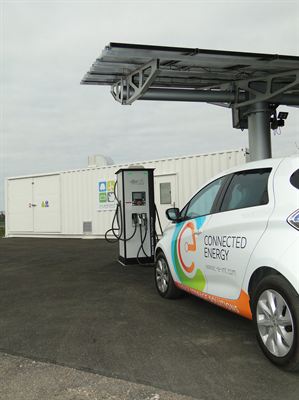2nd life electric vehicle batteries help manage grid load

The Department of Energy and Climate Change funded EVEREST energy storage project is now giving a 2nd life to used electric vehicle batteries, by providing grid support for electric vehicle charging at the Lotus Cars manufacturing site in Norfolk.
The newly commissioned energy storage system charges and discharges to manage and control the load that an electric vehicle rapid charger places on the local electricity network. The system promises a potentially cheaper and faster alternative to increasing grid connection capacity as demand for EV rapid charging continues to grow.
When commercialised, the system will reuse the increasing quantities of lithium ion batteries that have become depleted by their use in electric vehicles. The reduced capacity of the batteries may make them unappealing for electric vehicle drivers but they remain suitable for many stationary electricity storage applications.
The project was contracted by DECC in 2014, to prove that the so called 2nd life batteries could be used to manage the load that clusters of electric vehicle chargers will place on the grid network. An additional benefit is that the same system could discharge electricity back to the grid network on demand.
The EVEREST project is led by Evalu8 Transport Innovations with technical leadership and project management provided by Future Transport Systems. Other partners include battery specialists Goodwolfe Energy, electric vehicle charging infrastructure specialists APT Technologies and Circontrol.
“With sales of electric vehicles growing dramatically we expect the demand for rapid chargers to grow too, as drivers seek to extend their range. Clusters of chargers are likely to develop along major routes. The EVEREST storage technology is ideally suited to managing the increasing loads on the grid network, thus avoiding costly reinforcement,” commented EValu8’s Managing Director, Keith Bevis.
Ian McDonald, Technical Director of Future Transport Systems said, “This is a double win, the use of 2nd life batteries for this application should not only assist in the development of charging infrastructure for EV drivers but also contribute to the sustainability credentials of the EVs themselves.”
The EVEREST consortium includes:
Evalu8 Transport Innovations - Recharging network provider and Consortium lead.
Future Transport Systems - Technical lead, back office integration and project management.
Goodwolfe Energy - Cell integrator and battery specialist, battery build and test.
APT Technologies - EV charging equipment provider
Circontrol – Power electronics supplier, power conditioning and monitoring equipment
For further information see www.futuretransportsystems.co.uk
END
Notes to Editors
- Future Transport Systems Ltd (FTS) was established in 2009 and undertakes consultancy and R&D integrating electric vehicles, energy and mobility systems. FTS has contributed to some of the UK and Europe’s leading electric vehicle related projects including major vehicle trials, Vehicle to Grid projects and other project using electric vehicle batteries for static storage.
For further information please contact:
Matthew Lumsden, Managing Director, Future Transport Systems Ltd
Telephone 07909 681334
Email: Matthew.lumsden@futuretransportsystems.co.uk
- EValu8 Transport Innovations Ltd (EValu8) specialises in low carbon transport solutions, supports organisations to make more sustainable transport choices and manages the Source East network of charging points in the East of England.
For more general information or to arrange interviews with EVEREST Consortium partners, please contact
Keith Bevis, Managing Director, EValu8 Transport Innovations Limited,
Telephone 01707 284368,
Email: keith.bevis@evalu8-ti.org.uk
Evalu8 Transport Innovations Limited is a wholly owned subsidiary of the University of Hertfordshire, www.herts.ac.uk
Tags:


